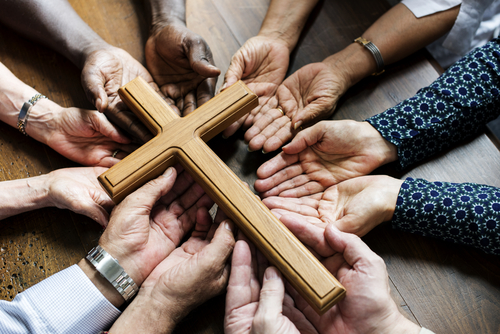Pope John Paul II in his Apostolic Letter “Dies Domini” (1998) states: “As the day of Resurrection, Sunday is not only the remembrance of a past event: it is a celebration of the living presence of the Risen Lord in the midst of his own people. For this presence to be properly proclaimed and lived, it is not enough that the disciples of Christ pray individually and commemorate the death and Resurrection of Christ inwardly, in the secrecy of their hearts. Those who have received the grace of baptism are not saved as individuals alone, but as members of the Mystical Body, having become part of the People of God. It is important therefore that they come together to express fully the very identity of the Church, the ekklesia, the assembly called together by the Risen Lord who offered his life "to reunite the scattered children of God" (Jn 11:52). They have become ‘one’ in Christ (cf. Gal 3:28) through the gift of the Spirit. This unity becomes visible when Christians gather together: it is then that they come to know vividly and to testify to the world that they are the people redeemed, drawn ‘from every tribe and language and people and nation’ (Rev 5:9).”
Full, conscious, and active participation in the Mass must be rooted in this awareness that we are “called together by the Risen Lord.” Gathering as church, or ekklesia, is “an essential dimension of our Christian identity” (Catherine Vincie, RSHM, “Celebrating Divine Mystery”). Through participation in the designated sacraments, and in a sacramental way of life, we are formed as a people of God, not just as persons in God. As a people, God’s grace enables us to share in God’s presence, and to bring that presence into the world. It is God who gives, and through our response to that giving, we become a means by which God’s presence is known in the world.
“Grace is the free offer of God to the human community to engage in a relationship of knowledge and love… It is simply the effect of God’s desire to share life with us. That is the mystery of salvation, first revealed to Israel, then brought to fullness in Christ, and now lived out in the church… God’s unambiguous call to divine/human encounter in love. The very existence of the church constitutes a mystery of God’s love… The liturgical assembly is as much a mystery of God’s salvific will as is the church and the covenanted community of Israel… We are and always will be a community called into being by God, and called into specific liturgical assemblies for God’s own purposes… The initiative comes from God; the response to gather comes from us.” (Vincie, “Celebrating Divine Mystery”)
The word “mystery” is used here as meaning the journey into the presence of God, the true source of all life and love. It is a mystery so vast that we are forever engaged and moved by its light and power. It is an ever unfolding, expanding and multiplying presence. It is this mystery that first calls us into being, and is continually reaching out, offering us a share in the eternity of love.
The liturgy is our human response to God that enables that communal journey into this profound truth. The liturgy is an ongoing dialogue with God, founded in the awareness that as church we are engaged together in this relationship. It is this relationship that gives us our common identity as a people of God.
The Mass is that centuries-old pattern of human communication directed towards God that forms us as one people, “ekklesia,” a church rooted, enveloped, energized and exploding with the love of God. Through our internal and external participation at Mass, we receive God’s call, and, as one people, enter into the mystery of God’s self-giving love. The unity of our baptismal connectedness is made visible at every Mass, but we are there, not just because we share in Christ’s mission that the world to be made right under the rule of God’s love. We are there firstly because God’s love calls us and unites us. It is God’s love that guides us, in and through Christ, and it is God’s love that is the foundation of all that we do.
We must first know ourselves as church, one people bound by God. It is that connectedness that then forms us in an expanding oneness with all of God’s creation. It is through communion in that forever love that we come to know how we must act and what we must do "to reunite the scattered children of God" (Jn 11:52), and to heal our wounded planet.
Start your day with Always Forward, our award-winning e-newsletter. Get this smart, handpicked selection of the day’s top news, analysis, and opinion, delivered to your inbox. Sign up absolutely free today!

